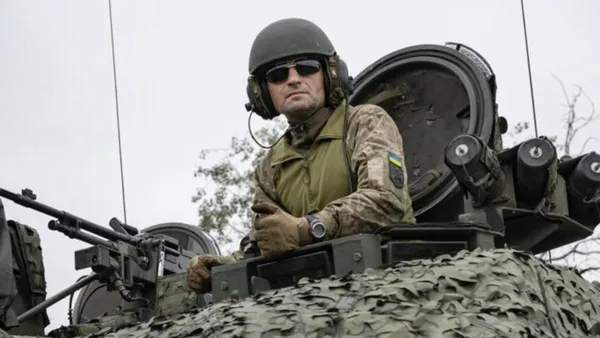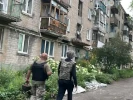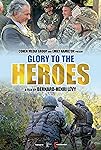Eye For Film >> Movies >> Glory To The Heroes (2023) Film Review
Glory To The Heroes
Reviewed by: Anne-Katrin Titze

“In homage to a lost generation of Ukrainians who died so that Ukraine will live” reads the dedication in Bernard-Henri Lévy’s third volume, Glory To The Heroes (L'Ukraine Au Cœur), again co-directed with Marc Roussel, produced by Emily Hamilton, and with Gilles Hertzog as special advisor. Following The Will To See (Une Autre Idée Du Monde) and Slava Ukraini, this documentary also chronicles the war in the shape of a filmic diary. The score at the start by Slava Vakarchuk is reminiscent of a whistling Western tune, simultaneously hopeful, melancholic, and foreboding.
It is the summer of 2023 and the first images remind us of the deluge. They are from the city of Kherson in June, a town under water, because the nearby Kakhovka dam was blown up on the sixth of that month by the Russian military, committing urbicide and ecocide. Lévy calls it the “Flooded Earth Strategy,” the latest update and variation on Hitler’s “Scorched Earth.” A small dog balances on a precarious plank across the water, the inhabitants in the midst of this man-made disaster already heroically start rebuilding the damage.

The documentary celebrates the striking resilience and reunites the film crew with a number of the brave men and women they had met six months earlier. The effect on viewers is startling because, unlike a TV series on summer break, what is eerily familiar speaks of war and terror and the Real. When the team again meets the same soldiers under the Antonivsky Bridge, there is a sense of relief, mixed with dread at what is still to come. Going back shows that their efforts in defending Europe are not forgotten by others beyond Ukraine, which is precisely the danger in a world with ever-faster news cycles spinning out of control.
Another danger, Lévy emphasises, is the spectre of the 1938 Munich Agreement, in which Sudetenland was handed over for Nazi Germany’s annexation, so alarmingly evoked by some present-day campaigning US politicians and those holding office who speak of a compromise from far far away that doesn’t seem to take into consideration the will of the Ukrainian people.
Meanwhile, Lévy and his team show in chapters of their passage that we can follow on a map, what the status quo looks like. Near Bakhmut the morale is high among the troops although the Russians are close by. The Ukrainian’s regional headquarters are in what looks like an abandoned house, where next to their computer setup we see children’s drawings on the wall. One soldier’s codename is Wikipedia.
The manner of attack may evoke the sub-current of war games, but footage of a bombed-out school and the visit to a woman who has nothing left but a destroyed home and a small garden in which she still, and despite it all, grows tomatoes and potatoes, makes it very clear that the consequences are concrete and devastating. “Drones replace the planes the allies did not send.” In the chapter on great people having great allies, we cross an empty Peace Square and meet a French soldier who signed up to fight. “Nicolas, it’s not your war” pokes Lévy, and his vis-à-vis makes it clear how much it concerns all of us in the West.
The explanation that the Russian army doesn’t take its dead soldiers but leaves them lying where they fell, is followed by images of a wooded area with hanging mines and leads up to a central question the filmmakers had to answer: Do they need to show the enemy and if so, how? The first answer is yes and the testament of the three prisoners interviewed (with their faces blurred to protect them) is revelatory.
L'Ukraine Au Cœur drives the message home about the long-lasting damage done to all, including the youngest, who had forgotten what the sky looked like or how to play. The most innocent of victims of war. Near the end, Lévy once more evokes the justifiable fear of a second Munich: “It is for us that the bell will toll should Ukraine fall. Russia must be defeated - no compromise, no delay.”
At one point Lévy asks “Where’s the frontline?” And a shot rings out, followed by an explosion, the frontline is here and now as the filmmaker is quickly shuttled to safety. “They stay while I leave.” Odesa, the city named by the Russian empress Catherine the Great, while still spared during the making of Slava Ukraini, was attacked this July, which left the Cathedral of Transfiguration destroyed and the grain shipments into the wider world grounded. Lévy reminds us of the Holodomor, Stalin’s deliberate starvation policy in the early 1930s, but also that Ulysses gave Odesa its name and that a Battle of Troy is raging.
History, to paraphrase Faulkner, is never dead, it’s not even history. Lévy says that “Ukraine’s anti-Semitic past is argument number one for those who don’t get involved” and counters the claim immediately by showing how the country “enjoyed a renaissance of Jewish life rare in Europe.” A trip to Bucha, a town that has become synonymous with barbarism, has, we learn, returned to almost, but not quite normal. In Yahidne, a village nearby, where all 376 residents were held captive for 27 days and nights, Lévy meets with three valiant teenage girls who descend with him into the underworld, the cellar where they experienced hell on earth.
Reviewed on: 04 Dec 2023















